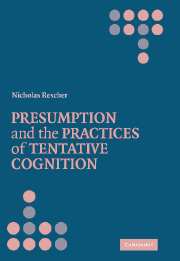Book contents
- Frontmatter
- Contents
- Preface
- Presumption and the Practices of Tentative Cognition
- 1 The Legal Roots Of Presumption
- 2 Presumption and Burden of Proof
- 3 Cognitive Presumption and Truth
- 4 Validating Cognitive Presumptions
- 5 Presumption and Inquiry
- 6 Default Reasoning
- 7 Presumption and Trust
- 8 Presumption and Communication
- 9 Presumption in Science and Beyond
- 10 Specificity Prioritization and the Primacy of the Particular
- 11 Dismissing Extremely Remote Possibilities
- Conclusion
- Bibliography
- Index of Names
4 - Validating Cognitive Presumptions
Published online by Cambridge University Press: 24 July 2009
- Frontmatter
- Contents
- Preface
- Presumption and the Practices of Tentative Cognition
- 1 The Legal Roots Of Presumption
- 2 Presumption and Burden of Proof
- 3 Cognitive Presumption and Truth
- 4 Validating Cognitive Presumptions
- 5 Presumption and Inquiry
- 6 Default Reasoning
- 7 Presumption and Trust
- 8 Presumption and Communication
- 9 Presumption in Science and Beyond
- 10 Specificity Prioritization and the Primacy of the Particular
- 11 Dismissing Extremely Remote Possibilities
- Conclusion
- Bibliography
- Index of Names
Summary
The Purposiveness of Presumption
Whenever we act and actually do something on the basis of a presumption we take a step beyond it: we make the assumption that it is correct. This assumption may turn out to be incorrect. But even if so, this nevertheless does nothing to unravel the validity of that initial presumption in the circumstances under which it arose. Its erroneousness is a matter of hindsight unavailable before the fact and represents a misfortune rather than a mistake.
The appropriateness of presumptions is not to be assessed on an individualized retail basis; instead the matter is one of wholesale – of the statistically systemic appraisal of the principles of presumption that underlie the particular case. Presumption is a methodological and procedural resource and must be judged on that basis through its performance “on the whole.” Thus epistemic presumptions exist to enhance our access to usable information, and communicative presumptions exist to facilitate the transmission thereof. The ultimate test of the appropriateness and validity of our presumptive proceedings in their various domains will be a matter of their efficacy in the realization of the correlative purposes – an ultimately pragmatic standard.
In the late nineteenth century, C. S. Peirce in the United States and Ernest Mach in Europe suggested an evolutionary rationale for certain presumptions such as trust in the senses and in various analogies.
- Type
- Chapter
- Information
- Presumption and the Practices of Tentative Cognition , pp. 45 - 63Publisher: Cambridge University PressPrint publication year: 2006



